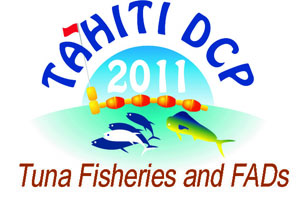An overview of FAD-based fisheries and FAD issues in Indonesian archipelagic waters
1 : Research Institute for Marine Fisheries
(RIMF)
Jl. Muara Baru Ujung, Jakarta 14440 Indonesia -
Indonésie
2 : CSIRO Marine and Atmospheric Research
(CSIRO)
* : Corresponding author
GPO Box 1538, Hobart, Tasmania 7000, Australia -
Australie
Indonesia's pelagic fisheries resources are of high economic importance to the nation's economy and equally, if not more important, as a domestic food resource. Anchored FADs (rumpon) have been a significant feature in Indonesia's pelagic fisheries for many decades. FAD construction varies regionally, with significant differences between western and eastern Indonesia. Surface structures for FADs include steel pontoon, bamboo raft (rakit), and bamboo raft with bungalow. Subsurface components include natural (coconut palm branches) and artificial (plastic streamer) materials. Depth of anchorage varies from in-shore coastal (<70m depth, anchored <3 nm from shore) to off-shore coastal (up to 2000m depth, anchored 40 – 80 nm from shore). The FAD-based fisheries include purse-seine, pole & line, troll-line and hand-line. Vessels range in size from < 5GT to 150 – 200GT. Trip length varies from 1-day fishing to 2 – 3 weeks. Transhipment to carrier vessels operates in some regions, and Nuclear Estate for Smallholders Scheme (i.e. mitra kolaborasi) is also common. Target species are generally skipjack, yellowfin, and bigeye tunas, and tongkol (Auxis thazard, A. rochei, and Euthynnus affinis). FADs are often provided to fishers through Provincial and Regency government assistance programs, but there are also many that are privately installed and privately owned. Management of the FAD fisheries, including licensing and regulation of FADs, remains a high priority issue for governments at all levels. Directorate General of Capture Fisheries currently have listing of 3858 FADs in Indonesian archipelagic waters but it is likely the actual number is significantly higher. There is high concern over the ever increasing number of FADs in Indonesian waters, the conflicts between gears, the associated impacts of increased fishing pressure on stocks of juvenile tunas, and likelihood of unsustainable fishing practices. New projects, involving collaboration between Indonesia and international agencies, are to conduct research to address these concerns.

 PDF version
PDF version
